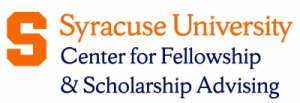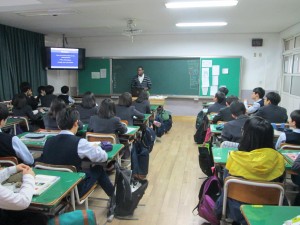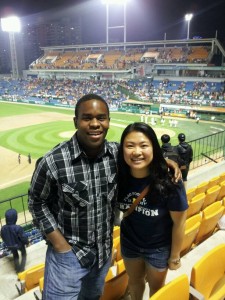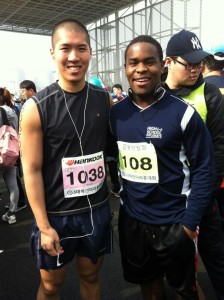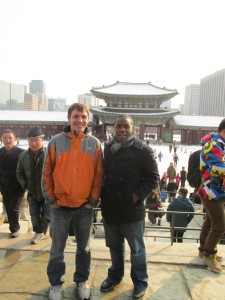6 questions with… Jonathan Nwosu ’12 (Fulbright ETA, South Korea)
1) Tell us about your teaching assignment. What’s your weekly schedule like?
My name is Jonathan Nwosu and I am currently on a Fulbright ETA Scholarship in Daejeon, South Korea. I work with five native-Korean English teachers at Jeonmin Middle School in Daejeon. Although ETA stands for English Teaching Assistantship, I am responsible for creating and executing my own lesson plans. While my colleagues focus on grammatical components, my role is to improve the students’ speaking abilities and to provide a cultural context for using English. In a given week, I teach eighteen regular classes with a textbook, and two after-school advanced discussion classes without a textbook. With the after-school class I have full freedom to teach whatever topics I think will be interesting, enjoyable, and beneficial for the students and topics this semester have included: creating advertisements, analyzing TV shows and musical lyrics, a class debate, doing a pen pal program, and doing the Post Secret project.
2) What’s been your greatest challenge and how did you deal with it?
My greatest challenge this year has been the process of learning how to teach. During the Fulbright orientation last summer, we were given teaching workshops and in-class experience with Korean students. However, it took me some time to get the handle on classroom management, creating well-structured lesson plans, and effectively executing those lessons. Throughout the year I worked hard at forming close friendships with my students, through playing basketball with them after-school or making myself available for conversation during lunch or other breaks. First, this helped me understand what the students needed academically and the best way to reach them. Second, the friendships translated into the classroom as I was able to garner the respect of my students resulting in efficient and productive classes.
3) Describe a memorable meal you’ve had – the food, company, and setting.
One of my fondest memories this year is a dinner that my Korean host family hosted for myself and several Fulbright ETAs that live in Daejeon. My host family owns a cottage in the outskirts of Daejeon and invited a few of my Fulbright friends for an evening of traditional Korean barbecue. It was a fun-filled night of over-indulging on barbecue, telling stories, and playing various American and Korean games.
4) What are you doing for fun?
In my free time, I have tried to truly take advantage of my grant year. First, I am involved with a weekly English tutoring program for North Korean defectors. One of my goals before coming was to learn more about the North-South Korean relationship, particularly regarding defectors from the North. Through this program, I have learned about the incredible journey that defectors undergo in order to escape, and the equally great challenge of fully integrating into South Korean society. Second, another goal for my grant year was to visit every province in South Korea. With Fulbright ETAs spread throughout the country, I have even more of a reason to travel extensively and see different places while visiting friends. So far, I have traveled to over ten cities and visited most of the provinces. Third, I am an avid sports fan! In addition to playing basketball with my students, I am involved in a recreational basketball league composed of foreigners and Koreans. Also, ticket prices for professional sports in Korea are exceptionally low, so I have been able to attend basketball, baseball, soccer, and volleyball games.
5) What’s been the most surprising aspect of your time there?
Since arriving in South Korea, numerous encounters or aspects of the culture have been surprising. Possibly the biggest surprise is the high status of teachers in Korean society. Korean teachers, at all levels, are extensively trained, well paid, and highly regarded in society. In fact, ‘Teacher’ itself is a title similar to ‘Doctor’ so my students call me Teacher Jonathan. When I meet Koreans my own age, and even parents of my students, they are extraordinarily respectful. These experiences are indicative of the broader emphasis that Korean society places on education, which is further reflected in the countless hours students spend studying and in private education, both after-school and on weekends.
6) Any advice for SU students applying to a Fulbright ETA?
Before applying for the Fulbright, I was very interested in Korean history, culture, and politics, and always wanted to spend time in South Korea. However, the real impetus to choose South Korea came while I was during research for my Honors Capstone. While doing research on Turkey, and studying abroad in Istanbul, I came across several scholars who compared the cultural changes and economic growth between Turkey and South Korea. As a result, I felt a connection between my past interests in South Korea with a need to broaden my knowledge base by going there in order to make the comparisons tangible. While my experience may be unique, I would urge a student interested in applying for the Fulbright ETA to have a substantial reason(s) for choosing a certain country. As an applicant, it is so much easier to write a Personal Statement and Statement of Grant purpose if there is a truly motivating passion for choosing a country, and that passion is clear in the essays.
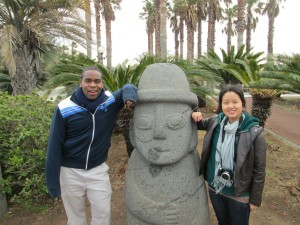
At the Fulbright Spring Conference on Jeju Island with Tsubasa Morioka, a fellow Fulbright ETA and SU alum.
Thanks for the update Jonathan! Interested in pursuing a Fulbright ETA or Research/Study grant? Get in touch with CFSA and explore the Fulbright information on this website and here: http://us.fulbrightonline.org/
